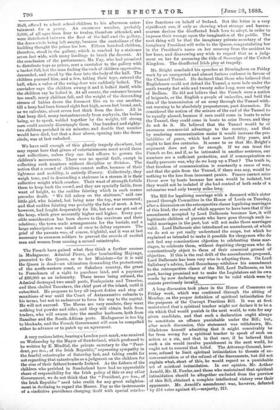A long discussion took place in the House of Commons
on- Friday week, which was continued through the sitting of Monday, on the proper definition of spiritual intimidation for the purposes of the Corrupt Practices Bill. It was at first maintained that'a spiritual teacher might not declare it to be a. sin which God would punish in the next world, to vote for any given candidate, and that such a declaration ought always to constitute an offence punishable under the Bill ; but, after much discussion, this statement was withdrawn, Mr.. Gladstone himself admitting that it might conceivably be far from wrong for a spiritual teacher to speak of such an action as a sin, and that in that case, if he believed that such a sin would involve punishment in the next world, he- ought not to conceal that belief. The Attorney-General, how- ever, refused to limit spiritual intimidation to threats of ex- communication or of the refusal of the Sacraments, but did not explain what, short of this, he would regard as a punishable act of spiritual intimidation. In oar opinion, Mr. Arthur Arnold, Mr. H. Fowler, and those who maintained that spiritual intimidation should be altogether excluded from the purview of this Bill, obtained a complete intellectual victory over their opponents. Mr. Arnold's amendment was, however, defeated by 254 votes against 43,—majority, 211.


































 Previous page
Previous page